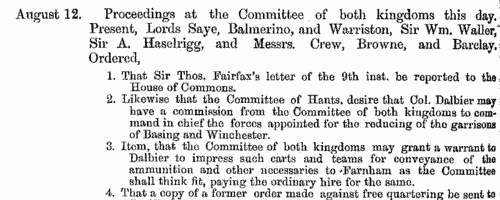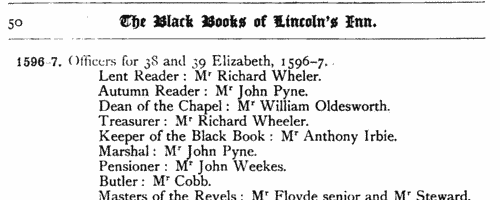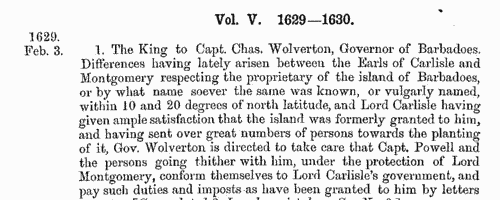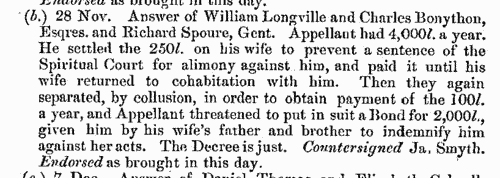Aylett Surname Ancestry ResultsOur indexes 1000-1999 include entries for the spelling 'aylett'. In the period you have requested, we have the following 131 records (displaying 11 to 20): Single Surname Subscription | | | Buying all 131 results of this search individually would cost £732.00. But you can have free access to all 131 records for a year, to view, to save and print, for £100. Save £632.00. More... |
These sample scans are from the original record. You will get scans of the full pages or articles where the surname you searched for has been found. Your web browser may prevent the sample windows from opening; in this case please change your browser settings to allow pop-up windows from this site. Astrologer's Clients
(1645-1646)
William Lilly, an astrologer, kept practice books listing his clients, their questions and the figures or horoscopes that he cast. Their questions relate to stolen property, probable success in any undertaking, ships at sea, health, long-life, love, marriage, pregnancy, &c. The books came into the possession of Elias Ashmole, who bequeathed them to Oxford University. This calendar was prepared by William Henry Black and printed in 1845. He lists the clients by folio number, remarking 'the names are often omitted, and usually written invertedly, or disguised in some other manner'. Where a date of birth is specified in the practice book, it is given in the calendar. Practice Book II is for consultations from 22 September 1645 to 17 August 1646.AYLETT. Cost: £6.00.  | Sample scan, click to enlarge

| Official Papers
(1645-1647)
The State Papers Domestic are the main series of records of internal British administration for this period. The volumes printed in abstract here (Charles I dx to dxv) run from July 1645 to December 1647, a period of defeat of royal power by the parliamentary forces. Parliament's victory at Naseby in June 1645 led to the collapse of the Royalist cause and the imprisonment of the king in Carisbrooke Castle towards the close of 1647. During all these events the administration of government continued, largely using the same institutions, leaving similar series of records as before: but executive power is now represented in these books by the Committee of Both Kingdoms (England and Scotland). The State Papers Domestic for these years are largely concerned with the prosecution of hostilities, the movements and supply of troops, and the treatment of 'delinquents'. Chronologically interleaved with the abstracts of the main volumes are details from the series of Proceedings of the Committee of Both Kingdoms, but these are lost for the years 1646 to 1647, brief notes only surviving in the Indexes to the Day Book of Orders. There are also appendices relating to the victualling and disposition of the Navy, taken from the Letters and Papers of the Committee for the Admiralty and the Committe of the Navy, which also include some petitions from sailors, victuallers, officials, or their dependants, seeking redress or relief.AYLETT. Cost: £4.00.  | Sample scan, click to enlarge

| Besiegers of Colchester
(1648)
The siege of Colchester was one of the most severe of the Civil War, and lasted from 14 June to 28 August 1648. Kent and Essex Royalists on their way into Norfolk and Suffolk turned aside into Colchester, hoping to get recruits there. Fairfax pursued from his headquarters in London, and when on 12 June he appeared with 5,000 men they were obliged to make hasty preparations for defence. The town was ill-fitted to stand a siege, and the 4,000 Royalist troops were most of them newly levied and ill-armed, but after a repulse on 14 June 14, Fairfax realized that a long siege was inevitable, and busied himself with raising forts to completely isolate the town. On 2 July the work of circumvallation was finished, and though meeting with fierce resistance, Fairfax gained post after post. Early in August famine added to the misery of the besieged, and the citizens began to clamour for surrender. On 19 August, Norwich, the Royalist leader, asked for terms; negotiations went on for some days, and finally on 28 August, Fairfax occupied the town. Three of the Royalist leaders were shot, and the soldiers were sent to labour in the West Indies, or to enforced military service under the Venetian Republic. The townsmen were made to pay a heavy fine.
These accounts list disbursements to workmen digging the fortifications and to artificers, soldiers and officers involved in the siege. The total sum paid was about £1,695.
AYLETT. Cost: £4.00.  | Sample scan, click to enlarge

| Lawyers and officers of Lincoln's Inn
(1586-1660)
Lincoln's Inn is one of the ancient inns of court in London exclusively invested with the right to call lawyers to the English bar. The Black Books of Lincoln's Inn are the main administrative records of the society, containing the names of those filling the different offices year by year; the annual accounts of the Pensioner and the Treasurer; regulations; punishments and fines for misdemeanours. This edition, printed for the inn in 1898, covers the volumes from the 20th year of the reign of queen Elizabeth to the end of the Protectorate, supplemented by material entries from another series, called the Red Books, surviving from 1614, which deal with orders concerning and admittances to the chambers of the inn.AYLETT. Cost: £4.00.  | Sample scan, click to enlarge

| Colonists and adventurers
(1610-1660)
During this period, the English crown issued charters to companies of adventurers and individual proprietors to establish settlements in Acadia (Nova Scotia), Africa, Amazon, Anguilla, Antigua, Association (Tortuga), Bahamas, Barbadoes, Barbuda, Bermudas (Somers Islands), Canada, Cape Gratia de Dios, Carolina, Bay of Darien, Delaware Bay, Deseada, Dominica, Eleuthera, Enegada, Fernando de Noronho, Floria, Fonseca, Grenada, Guadaloupe, Guiana, Guinea, Henrietta, Jamaica, Long Island, Maine, Marigalante, Maryland, Metalina, Montserrat, Narrangansetts Bay, Nevis, New England (New Plymouth, Massachusetts, Connecticut and New Haven), Newfoundland, New Hampshire, New York, Nova Scotia, Providence Island, Quebec, Redendo, Rhode Island, St Bartholomew, St Brandon, St Christopher's, St Eustache, St Lucia, St Martin, St Vincent, Sembrera, Surinam, Tadousac, Tobago, Todosantes, Trinidad and Virginia. The central archive relating to these ventures up to 1688 amounted to 71 volumes of correspondence, plus 109 entry books containing entries of letters sent to the colonies, of charters, commissions and instructions, minutes and proceedings of the companies and proprietaries that in the first instance governed several of the colonies, journals of the Board of Trade, &c. This archive, called the State Papers, Colonial Series, at the Public Record Office, was calendared for the period through to 1660 by W. Noel Sainsbury, and published in 1860. The first few pages include material as early as 1574, but the bulk of the volume is from 1610 to 1660, and that is indexed here.AYLETT. Cost: £4.00.  | Sample scan, click to enlarge

| London Marriage Allegations
(1611-1660)
London, Essex and part of Hertfordshire lay within the diocese of London. In the later 17th century the individual archdeaconry courts issued marriage licences, but for this period the only surviving material is from the overarching London Consistory court. The main series of marriage allegations from the consistory court was extracted by Colonel Joseph Lemuel Chester, and the text was edited by George J. Armytage and published by the Harleian Society in 1887. A typical later entry will give date; name, address and occupation of groom; name, address and condition of his intended bride, and/or, where she is a spinster, her father's name, address and occupation. Lastly we have the name of the church where the wedding was going to take place. For the later years Colonel Chester merely picked out items that he thought were of interest, and his selections continue as late as 1828, but the bulk of the licences abstracted here are from the 17th century.AYLETT. Cost: £4.00.  | Sample scan, click to enlarge

| Official Papers
(1660-1661)
The State Papers Domestic cover all manner of business relating to Britain, Ireland and the colonies, conducted in the office of the Secretary of State as well as other miscellaneous records. The records of these years immediately after the restoration of the monarchy include many petitions to Charles II for offices and possessions lost during the Civil War.
AYLETT. Cost: £4.00.  | Sample scan, click to enlarge

| Allegations for marriages in southern England
(1660-1679)
The province or archbishopric of Canterbury covered all England and Wales except for the northern counties in the four dioceses of the archbishopric of York (York, Durham, Chester and Carlisle). Marriage licences were generally issued by the local dioceses, but above them was the jurisdiction of the archbishop, exercised through his vicar-general. Where the prospective bride and groom were from different dioceses it would be expected that they obtain a licence from the archbishop; in practice, the archbishop residing at Lambeth, and the actual offices of the province being in London, which was itself split into myriad ecclesiastical jurisdictions, and spilled into adjoining dioceses, this facility was particularly resorted to by couples from London and the home counties, although there are quite a few entries referring to parties from further afield. The abstracts of the allegations given here usually state name, address (street in London, or parish), age, and condition of bride and groom; and sometimes the name, address and occupation of the friend or relative filing the allegation. Where parental consent was necessary, a mother's or father's name may be given. The ages shown should be treated with caution; ages above 21 tended to be reduced, doubtless for cosmetic reasons; ages under 21 tended to be increased, particularly to avoid requiring parental consent; a simple statement 'aged 21' may merely mean 'of full age' and indicate any age from 21 upwards. These are merely allegations to obtain licences; although nearly all will have resulted in the issuing of the licence, many licences did not then result in marriage. This index also includes marriage licence allegations for the jurisdiction of the Dean and Chapter of Westminster, 1558 to 1699.AYLETT. Cost: £4.00.  | Sample scan, click to enlarge

| Allegations for marriages in southern England
(1669-1679)
The province or archbishopric of Canterbury covered all England and Wales except for the northern counties in the four dioceses of the archbishopric of York (York, Durham, Chester and Carlisle). Marriage licences were generally issued by the local dioceses, but above them was the jurisdiction of the archbishop, exercised through his vicar-general. Where the prospective bride and groom were from different dioceses it would be expected that they obtain a licence from the archbishop; in practice, the archbishop residing at Lambeth, and the actual offices of the province being in London, which was itself split into myriad ecclesiastical jurisdictions, and spilled into adjoining dioceses, this facility was particularly resorted to by couples from London and the home counties, although there are quite a few entries referring to parties from further afield. The abstracts of the allegations given here usually state name, address (street in London, or parish), age, and condition of bride and groom; and sometimes the name, address and occupation of the friend or relative filing the occupation. Where parental consent was necessary, a mother's or father's name may be given. The ages shown should be treated with caution; ages above 21 tended to be reduced, doubtless for cosmetic reasons; ages under 21 tended to be increased, particularly to avoid requiring parental consent; a simple statement 'aged 21' may merely mean 'of full age' and indicate any age from 21 upwards. These are merely allegations to obtain licences; although nearly all will have resulted in the issuing of the licence, many licences did not then result in marriage. AYLETT. Cost: £4.00.  | Sample scan, click to enlarge

| House of Lords Proceedings
(1690-1691)
Private bills dealing with divorce, disputed and entailed estates: petitions, reports and commissions: naturalisation proceedings.
AYLETT. Cost: £4.00.  | Sample scan, click to enlarge

|
Research your ancestry, family history, genealogy and one-name study by direct access to original records and archives indexed by surname.
|












